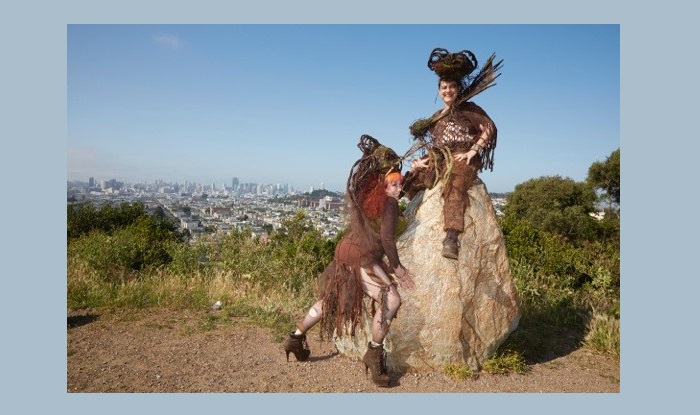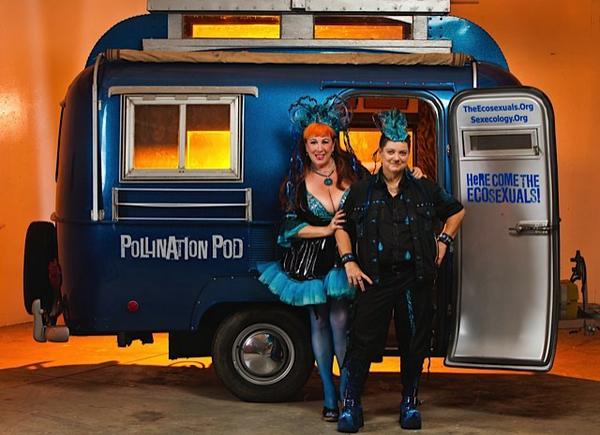Beth Stephens & Annie Sprinkle
“Life shrinks or expands in proportion to one’s courage.” -Anais Nin
Nature is born of sexuality.
The two are inextricable and inevitable partners. Where humans find fault with sex that does not suit their particular beliefs in what is right or wrong, nature transcends. There is no taboo in the natural world, there is no polite side-stepping of the rawness of nature. Nature simply is, in all its sensual glory.
Beth Stephens & Annie Sprinkle have collaborated for 17 years.
They recently showcased their film Water Makes Us Wet at Documenta 14. They were one of just 180 artists at the exhibition which takes place only every five years and draws in a million people. In conjunction with the film they exhibited visual art, performed Ecosex Walking Tours, and facilitated “sidewalk sex clinics.” Their film premier at the Gloria Theater was the only one to completely pack the house. For their Documenta Ecosex Walking Tour, Stephens & Sprinkle consciously began at the site of the first tree planted in Joseph Beuys’ 1982 Documenta project 7,000 Trees.
Their film is part art, part activism, a call to action, and a vision of how the future may look if we are careful with the earth as opposed to how it could look if we continue our ecologically destructive behaviors. Within the environmental activist movement, the two always felt a bit out of place. They felt the need to hide their flamboyance, their sexuality, and some of the details of their pasts. Because of this they began their own movement, an all inclusive environmental activism that encourages people to be themselves.
By allowing people to embrace their own identities and to infuse a little fun, they hope to create a movement that is sustainable and perhaps avoids some of the activist burnout that frequently effects those constantly fighting for the future of a healthy planet.
For the film, and throughout their work, Stephens & Sprinkle have unabashedly embraced and exposed their own bodies. In so doing, they show both their vulnerability and their strength as well as embrace their advancing age. Sprinkle, who is now 63, was once a pornographic film actress. She finds that showing her 63 year old body has pushed more limits than anything she’s ever done. “I think that taboo does need fixing,” she says.
During the making of the film, Stephens & Sprinkle were in a serious auto accident which features in the documentary. The two were seriously injured and hospitalized but eventually walked away. The wreck served as a metaphor for the universality of “eco-sinners” in that even the filmmakers were driving around in an old, polluting van.
The two describe the incident as romantic and remarkable and say it has given them a new lease on life. The accident was a result of another driver’s distracted driving. The film as a whole is a look at the issues facing the planet, some of those perpetrating them, and ways to think about the problem. “What we really hope with our film is that people leave the film thinking about the issues we’ve presented but also feeling like well, there is something I can do in my personal life.”
The term “eco-sexual” was originally used by dating sites and subsequently in a book titled Eco-sex: Go Green Between the Sheets and Make Your Love Life Sustainable by Stephanie Iris Weiss. Stephens & Sprinkle took the term and created an art movement around it. “We like to think that all sex is eco-sex including human on human because we are the earth, we’re not separate from the earth…we acknowledge all the sexuality that is going on around us.” At UC Santa Cruz where Stephens is a professor, the two established E.A.R.T.H Lab which stands for Environmental Art Theory & Happenings. There they incorporate some of the principles of ecosexuality in the programs they run. For the Silo, Brainard Carey.

